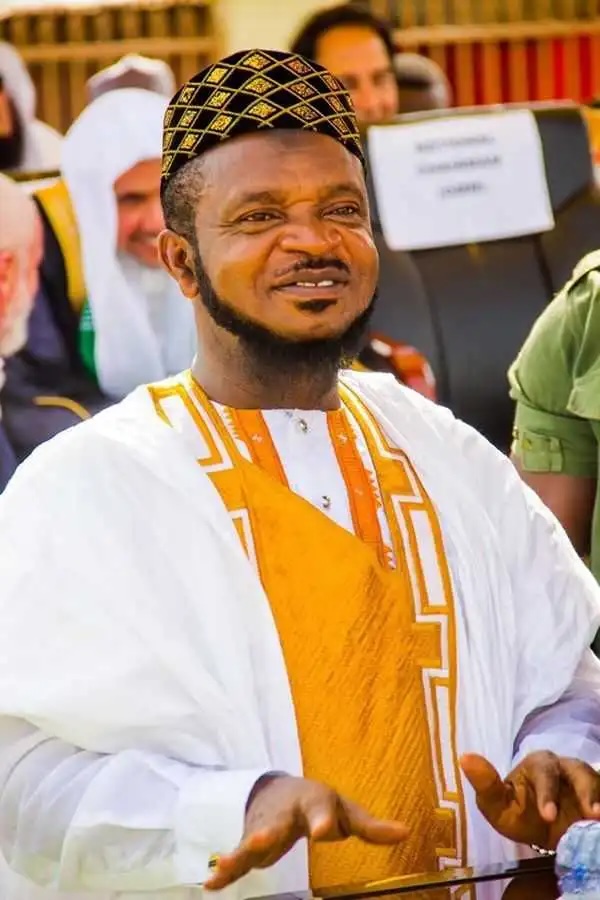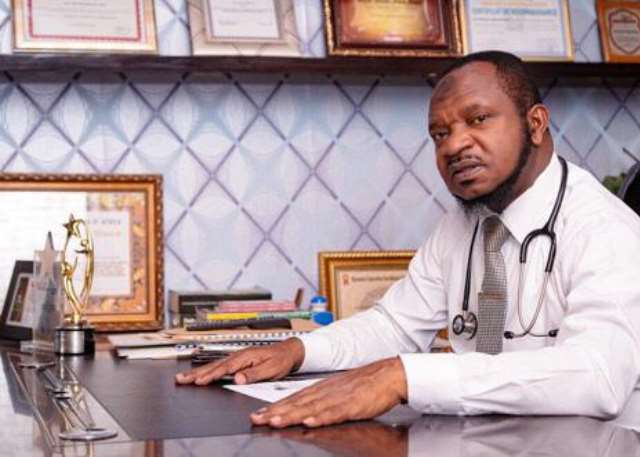
Sheikh Dr. Amin Mohammed Osei Bonsu
Founder & CEO
Early Life and Family
Sheikh Dr. Amin Mohammed Osei Bonsu, commonly known as Sheikh Dr. Amin Bonsu, was born in Ghana in 1959. He hails from a family with a deep-rooted tradition of healing and community service. His father, Mohammed Osei Bonsu, also known as Nana Bonsu, was a renowned traditional medicine practitioner who inherited his knowledge from his father and grandfather. This familial legacy played a pivotal role in shaping Amin’s empathy for the sick and his eventual pursuit of alternative medicine. Observing his father’s work with patients instilled in him a passion for holistic healing from a young age.
Amin, a devoted father and family man, is married to Hajia Fati Ibrahim Baryeh and Hajia Yasmin Mohammed Amin. Together, they are blessed with four sons and three daughters. As an Imam and Islamic scholar, he integrates family values with his religious and professional life, often emphasizing the importance of community and spiritual well-being in his public teachings.
In addition to his roles as a religious leader and health practitioner, Dr. Amin Bonsu has served Ghana in various national capacities, notably as a Former Board Member of the Centre for Research into Plant Medicine and as a Former Member of the Hajj Board.
Education
Amin Bonsu’s educational journey reflects a blend of academic rigor, Islamic studies, and specialized training in alternative medicine across multiple countries and disciplines. He completed his secondary education in 1980, followed by advanced studies in Economics, Islamic Religious Studies, and the Royal Society of Arts Advanced Level in 1982. During this period, he also began teaching, balancing professional duties with further studies.
While teaching, he expanded his expertise in accounting, studying Commercial Cost Accounting and later earning a Diploma in Accounting through advanced professional training in Great Britain. Influenced by his father, he pursued higher education in alternative medicine, obtaining degrees in Osteopathy and Naturopathy in 1985, followed by a Higher Diploma and a PhD in Natural Science in 1987. This achievement granted him international recognition as a practitioner of alternative medicine.
His commitment to Islamic scholarship led him to further studies in Arabic and Islamic Religious Studies, after which he spent some time teaching abroad. In 1990, he relocated to Japan, where he pursued additional training and earned a Diploma in Teaching English as a Foreign Language in 1995. Upon returning to Ghana in 1996, he broadened his medical credentials by studying Homeopathy and receiving a Diploma in that field. His qualifications also encompass expertise in Physiotherapy, Homeopathy, and Naturopathy, as reflected in his professional affiliations.
This diverse educational background equipped him with a unique fusion of Western academic training, Eastern pedagogical skills, and African traditional healing practices.
Early Career and International Experience
Amin Bonsu’s early career was marked by teaching and international exposure, which broadened his worldview and honed his skills in education and medicine. After completing his A-levels, he taught at the Islamic Secondary School in Ghana while pursuing further studies. His time in Libya involved not only advanced Islamic studies but also teaching roles, where he contributed to religious education. In 1990, he moved to Japan, where he practiced alternative medicine while studying English language teaching, earning his diploma in 1995. These international experiences allowed him to interact with diverse cultures and refine his holistic health approach, incorporating global perspectives into his practice.
Establishment and Growth of Amen Scientific Herbal & Alternative Medical Hospital
Upon returning to Ghana in 1996, Amin Bonsu dedicated himself to advancing alternative medicine by establishing the Amen Scientific Herbal & Alternative Medical Hospital (commonly referred to as Amen Herbal Hospital). The hospital began modestly as a clinic in Edwinase, Kumasi, drawing on his family’s traditional healing heritage and his formal training in naturopathy, osteopathy, and homeopathy. It later relocated to Atwima-Techiman for expansion, followed by the opening of a second branch in Bibiani. The Accra Dome branch marked a significant milestone, enhancing accessibility in the capital region.
Today, the hospital boasts multiple branches across Ghana, including Mrom (Kejetia, Kumasi), Atwima-Techiman (Kumasi), Dome (Accra), Lashibi (Klagon, Accra), Takoradi, Nkawkaw, Ho, Bibiani, Atebubu, Komkompe, Hohoe, Nkwanta, Tamale, Enchi, Bolgatanga, and Sunyani. As CEO, Amin oversees a team of skilled professionals offering phytotherapy, naturopathy, homeopathy, and advanced diagnostics.
The hospital specializes in treating chronic and complex conditions such as stroke, infertility, neuropathy, prostate disorders, kidney and liver issues, constipation, dysmenorrhea, syphilis, heart palpitations, and malaria—often with herbal solutions that emphasize holistic wellness. Products like Mist Amen Fevermix are FDA-approved and have been listed on Ghana’s Essential Herbal Medicines List since 2008, with clinical studies demonstrating their efficacy. The hospital attracts patients from across Africa and Western countries, underscoring its reputation for quick, successful outcomes in chronic disease management. Amin frequently addresses misconceptions about herbal medicine, advocating for its benefits and emphasizing its one-year FDA-approved shelf life.
In a pioneering move, Amen Scientific Herbal Hospital became the first institution to provide internship opportunities for students from the Kwame Nkrumah University of Science and Technology (KNUST) School of Herbal Medicine, fostering the next generation of practitioners in traditional and alternative medicine. Additionally, Amin founded the Amen Professional College (also known as Amen College of Health Sciences) in Kumasi, which focuses on training in Registered General Nursing, Midwifery, and Complementary Health Care. Although plans for educational initiatives under his leadership date back to earlier projects, the college held its maiden matriculation in June 2023, admitting 80 students with the aim of producing competent health professionals.
Leadership in the Ghana Muslim Mission
In addition to his medical career, Sheikh Dr. Amin Bonsu has risen to prominence in Ghana’s Islamic community as the National Chairman of the Ghana Muslim Mission (GMM), a role he assumed after serving as Regional Chairman in 2011 and Second Deputy National Imam. Under his leadership, the GMM has expanded its educational, social, spiritual, health, and economic programs. As Chairman, he has overseen the establishment of 166 schools across Ghana, including kindergartens, junior highs, senior highs, and tertiary institutions.
He played a key role in elevating the Ghana Muslim Mission College of Education to public institution status and founded the Ghana Muslim Mission Senior High School, where he actively engages with students through visits and inspirational talks. He also organizes annual national conferences, such as the 63rd in 2023, and delivers sermons on topics such as lessons from Ramadan, the importance of Salat, and uplifting the soul. His involvement extends to philanthropy, including support for schools like Hijaz, and calls for Muslim organizations to empower communities through Zakat.
Beyond the Mission, Sheikh Dr. Amin Bonsu holds several other high-profile leadership roles. He serves as the Chairman of the Board of Patrons of the Ghana Muslim Students Association (GMSA), where he provides guidance for student reforms and initiatives. He is also an Executive Member of the National Mosque Committee for the Ghana National Mosque, contributing to the management and development of this key Islamic landmark. Additionally, he is the Vice Chairman of the Islamic Education Council in Ghana, supporting efforts to strengthen Islamic educational systems nationwide.
Achievements and Awards
Sheikh Dr. Amin Bonsu’s contributions to herbal medicine and Islamic leadership have earned him numerous accolades. In 2019, he was honored as Business Leader for Health Medicine and African Business Leader in the Herbal-Medicine Industry. In 2020, he received the African Traditional Medicine Award at the third Annual Global Black History Honours. His work has also been widely featured in media interviews, where he shares health advice on platforms such as UTV Ghana, Adom TV, and Peace FM.
Internationally, he has received recognition from neighboring countries. In 2012, the Traditional Medicine Directorate of the Ivorian Ministry of Health honored him during a visit to explore cooperation in traditional medicine practices, following a delegation’s tour of Amen Scientific Herbal Hospital. That same year, Dr. Eloi Some of Burkina Faso’s Food and Drugs Board visited Sheikh Amin Bonsu to learn from Amen Scientific’s operations, strengthening Ghana-Burkina Faso collaboration in herbal medicine. During this period, the president of the West Africa Traditional Medicine Association declared him the Best in Africa for his contributions to the field.
Philanthropy and Community Service
As a philanthropist, Amin Bonsu supports educational and health initiatives through the GMM and his hospital. He advocates for youth development, unity among Muslims, and holistic health practices that align with Islamic principles. His efforts include school visits, fundraising for institutions such as Hijaz School, and promoting Zakat as a tool for empowerment. He is also active in interfaith and national dialogues, including tasking regional imams with unification efforts.
Personal Life and Legacy
Sheikh Dr. Amin Bonsu is a multifaceted individual: an Imam, scholar, doctor, entrepreneur, counselor, and philanthropist. He maintains an active presence on social media, sharing health tips, Islamic insights, and motivational content via platforms such as Facebook, Instagram, and TikTok. Residing primarily in Ghana, he balances his roles with a deep commitment to family and faith.
His legacy endures through the thriving Amen Hospital network, the GMM’s expanded institutions, and his influence on thousands seeking healing. Amin continues to inspire through his work, embodying the integration of tradition, science, and religion for the betterment of society.


